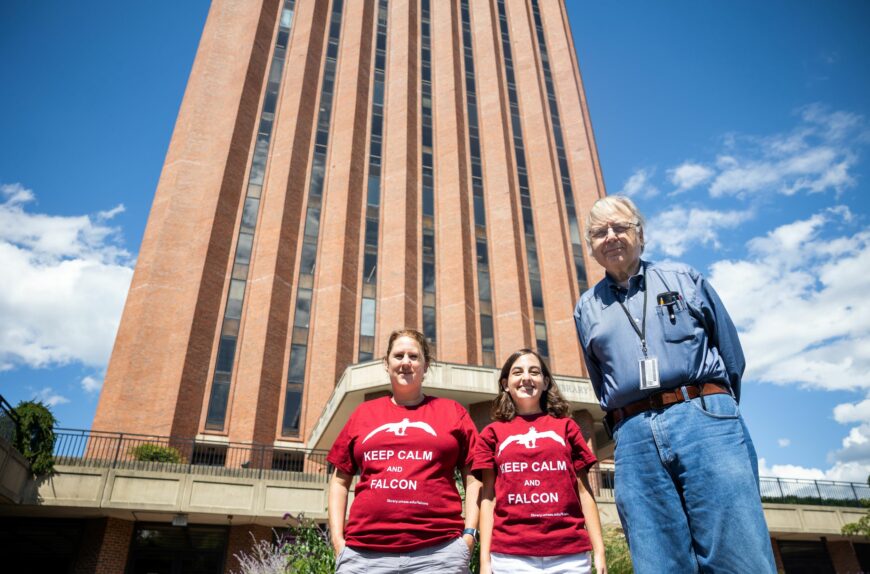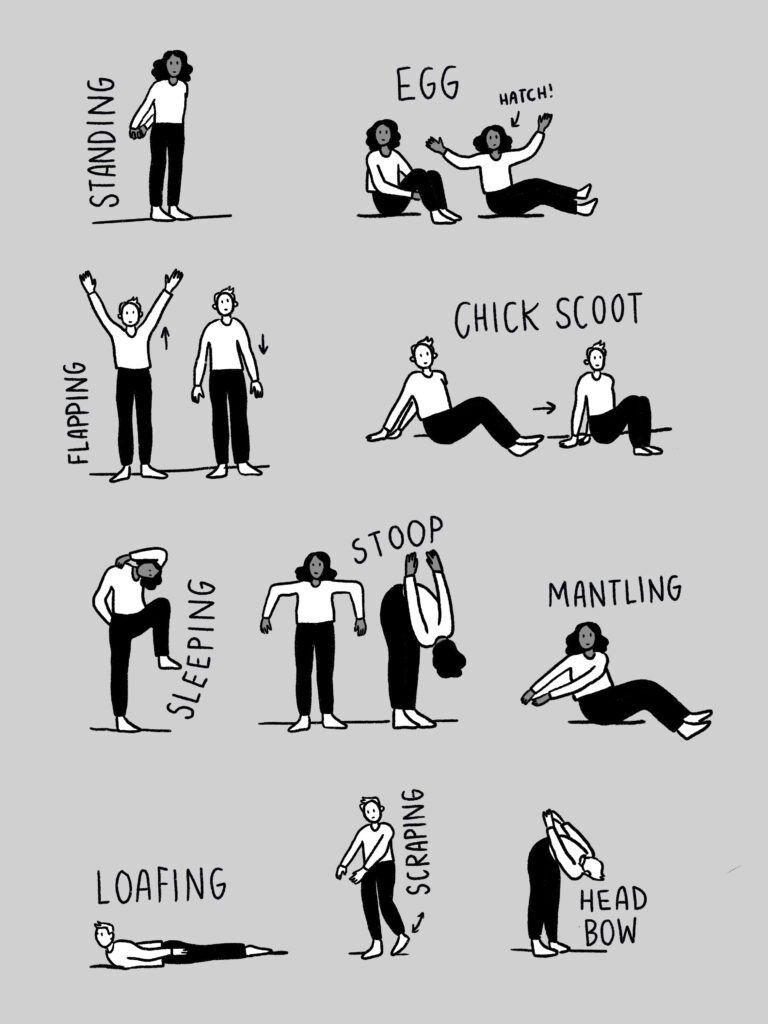
Falcon Curriculum Takes Flight
Peregrine falcons have been nesting atop the W. E. B. Du Bois Library since the late 1990s. Twenty-five years later, they officially enter the classroom.
by Lauren Weiss
Associate Editor, Digital Content
A new peregrine falcon curriculum for pre-kindergarten through grade 12 is now freely available for educators worldwide to use, share, and remix, thanks to staff ingenuity, creative Massachusetts teachers, generous donors to the Library Sustainability Fund, and, of course, the resident falcons atop the W. E. B. Du Bois Library.
As the Libraries’ associate editor of digital content and member of the falcon team, it is my privilege to monitor the rooftop livestream camera during the spring–summer nesting season and run the @DuBoisFalcons Twitter account to keep our falcon fans updated as eggs are laid and chicks hatch, grow up, and fledge. During the 2021 falcon nesting season, three Massachusetts teachers were streaming the live feed from the falcon camera into their kindergarten, first, and fifth-grade classrooms, and their students had lots of questions. Why do the falcon parents sit on their chicks? How can you tell which is the mom and which is the dad? How big are falcons compared to five-year-olds?
With help from Richard Nathhorst ’79 (research facilities manager), Tom French (retired assistant director of MassWildlife’s Natural Heritage and Endangered Species Program), and David Paulson ’10MS (supervisor of the Massachusetts Department of Transportation Wildlife and Endangered Species Unit), I answered every question posed by the students throughout the nesting season. Additionally, I sent the classes stickers and falcon keychains, which were 3D-printed in the Libraries’ Digital Media Lab, encouraged the young fans to enter the falcon chick naming contest, and invited them to take part in the first annual FalConference, a free, virtual conference where the falcon team shared all things peregrine with bird lovers across the country. The students especially enjoyed watching the live Birds of Prey program hosted by local raptor rehabilitator Tom Ricardi of Conway, Mass., who is seasoned at engaging audiences of all ages, as he often speaks in classrooms and public libraries.
The positive feedback I received from the educators and their students, coupled with the success of the conference, led our falcon team and partners at MassWildlife to think about ways the Libraries could formalize outreach and share educational information with others who might be interested in incorporating the falcons into their classrooms. The idea for a falcon curriculum encompassing lessons for pre-kindergarten through grade 12 was hatched.
French and Paulson were particularly enthusiastic about the project as a way to teach young people about the science and history of this once-endangered species. “I am incredibly excited for the curriculum,” Paulson says. “There is a lot of interest in this effort. The peregrines have really become a passion. Their recovery is a conservation success story, and they serve as ambassadors for conservation here in Massachusetts, being both charismatic and accessible.”
In alignment with the Libraries’ goal of accessibility, the curriculum was designed from the beginning to serve as an open educational resource (OER), meaning that it would be freely available to anyone, anywhere, to use and/or adapt. The Libraries, and UMass Amherst as a whole, adhere to principles of open access and support the creation of OERs. The Libraries maintain an online open access institutional repository as well as partner with the Office of the Provost, the Center for Teaching and Learning (CTL), and the Instructional Design, Engagement, and Support (IDEAS) group to award annual Open Education Initiative grants to UMass Amherst instructors to adopt, adapt, and develop OER materials.
While serving as interim dean of the Libraries, Sarah Hutton, PhD, reached out to Margaret Krone ’12MS, ’25PhD (College of Education). Krone had received a sustainability curriculum fellowship, a year-long interdisciplinary fellowship from the chancellor’s office that provides funding toward developing or augmenting courses with sustainability-related topics. Krone eagerly accepted the task of going through the Common Core educational standards for pre-kindergarten through the 12th grade and selecting which standards would be appropriate to map to the falcon curriculum.
“I got involved with this project due to my love of OER and for creating engaging educational content,” says Krone. “Products like this are important because they allow people to think creatively while using systems of structure or framework already in place.” She says she learned much in the process and hopes the falcon curriculum “serves as a model for other people to learn about how to collaborate and build resources that are available to others.”
Due to my work on the falcon team, I took on the roles of project researcher, resource collector, and lesson plan developer, building out STEM/STEAM-based activities for each Common Core standard Krone selected. A kindergarten standard outlining students’ understanding of basic motion and forces, for example, begs the question, “How do birds fly?” with associated lesson plans of watching short videos, building paper birds with moveable wings, and even learning falcon flight-inspired yoga poses.

With regard to the short videos, I recruited my brother, Max Weiss, a recent graduate from Quinnipiac University’s film studies program, to develop the curriculum’s video content. Max’s background is in producing engaging online educational content for students, so it was a perfect fit. “My passion for Star Wars led me to this project,” Max says. “The creatures in the worlds of those films amaze me and encourage me to learn more about the real-life animals that many of them are based on.”
Coincidentally, much to Max’s and my delight, two of the winning entries in the 2022 Du Bois falcon chick naming contest were Han Solo and Chewbacca, the famous pilots of the Millennium Falcon in the Star Wars movies. Our Han and Chewie, along with their siblings Dewey Duck and June, and other Du Bois chicks from previous years, are featured in the videos, which focus on a range of topics from basic falcon information to their comeback from near extinction in North America.
We’ve been working on this project now for more than a year, and we hope that, like peregrine falcons, our curriculum “migrates” to local, national, and possibly even international educators looking to teach their students about these incredible birds.